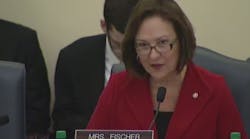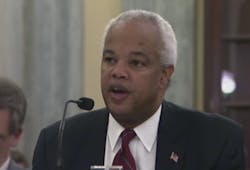Pointing to critical reports from independent agencies, Sen. Deb Fischer (R-NE) plans to introduce legislation to reform the Federal Motor Carrier Safety Administration and “ensure that the [regulatory] process is more inclusive of Congress and stakeholders.”
“I share the FMCSA’s commitment to increasing the safety of our nation’s roads. We must never lose sight of this goal,” Fischer, the chair of the Senate Commerce subcommittee on surface transportation, said Wednesday in a hearing focused on the trucking regulatory agency. “Some of the FMCSA’s actions over the past several years, however, challenge our shared goal of enhancing safety.”
Fischer used her opening statement to outline problems with both the hours of service (HOS) rule and the Compliance, Safety, Accountability (CSA) program—each a critical and recently controversial component of the agency’s safety regime.
Regarding HOS, the 2013 changes to the restart restrictions were made “with complete disregard for congressionally-mandated requirements for an efficacy study on the rule’s impact,” the senator said, and the eventual report “was not representative of this diverse industry.”
Additionally, she noted the restart rule’s “perverse impact on safety” because the required back-to-back overnight rest periods pushed drivers onto the roads during busy morning commute times.
As for the agency’s carrier safety comparison process, “inaccurate CSA scores, publically available online, have cost companies contracts and raised insurance rates – all of this has occurred without a clear correlation to increasing highway safety,” Fischer said.
FMCSA also “completely disregarded” recommendations by the Government Accountability Office (GAO), whose analysis of CSA pointed to significant flaws in the methodology.
Coming reform legislation will focus on a complete review of FMCSA’s current guidance, and establish a regulatory framework which must include “a more robust cost-benefit analysis” that represents carriers from a wide variety of business models and, when necessary, the agency should also conduct "a real-world study” of the proposed regulation.
“Though the burden of FMCSA’s mission is immense, Congress must reform the agency to ensure higher levels of trust, collaboration, and, ultimately, more effective regulations to keep our nation’s roads safe,” Fischer said.
'Cost of doing business?'
That burden was reflected in the partisan political split of the subcommittee, and in the criticisms leveled by the panel of witnesses: While Fischer and the Republicans are concerned that FMCSA is being heavy-handed in its regulations, Sen. Cory Booker, a New Jersey Democrat and ranking member, argued that the agency should do more.
“From 2009 to 2012, truck crash injuries increased by 40% and fatalities increased by 16%,” Booker said. “This is absolutely unacceptable. This cannot simply be the cost of doing business. There are reasonable, common sense steps we can take to address this. There’s no place on our roads for tired truckers.”
Booker took particular exception to the Congressionally-mandated rollback of the restart provisions, which he strenuously opposed, because drivers can conceivably work 80-hour weeks under the pre-2013 restart.
He also noted concerns about truck size and weight, minimum carrier insurance levels, and even driver pay.
Witnesses included representatives of the GAO, the DOT’s Office of the Inspector General (OIG) and the National Transportation Safety Board (NTSB), along with FMCSA Acting Administrator Scott Darling.
In their respective testimony GAO Director Susan Fleming outlined last year’s CSA study, which concluded some basic changes could vastly improve the program’s effectiveness; OIG’s Joseph W. Comé discussed a number of “challenges” facing the FMCSA, including data quality and CSA, reincarnated motor carriers, and fraud; and NTSB Acting Chairman Christopher Hart noted that the board had issued 126 safety recommendations to FMCSA over the years and that half remain open, with a particular focus on the importance of driver fatigue and electronic logging devices.
Few specifics
For his part, Darling largely acknowledged the criticisms, but offered few details as to plans for strengthening the agency.
Asked directly by Fischer, several times, to detail the ways the agency is working to refine CSA, Darling repeatedly emphasized FMCSA’s commitment to high safety standards and “continuous improvement,” and defended the quality of the data that underlies the system.
“It takes time to make sure that we have a system that works, and we believe we have a system that works today,” Darling said, adding that he was “not at a place” to identify specific reforms expected by the end of the year.
Among the industry reaction, American Trucking Associations (ATA) called on FMCSA to make changes to CSA following the hearing.
"The flaws in CSA were again highlighted and again the agency insisted it will do nothing to correct them,” ATA President & CEO Bill Graves said. “FMCSA should not just hear the concerns expressed by Senator Fischer and the GAO, but address them with real action.”
ATA has previously called on FMCSA to change how it uses crash history in CSA, as well as to remove CSA scores from public view until the system is improved.
Succession plan?
One item of note, however, is that Darling did offer some insight into his status at the agency—an issue raised by senators in a hearing Tuesday with Transportation Sec. Anthony Foxx.
Darling reported that his term as acting administrator ends March 23, and that he “currently serves at the will of the President.”
“It’s my understanding that the administration is vetting some candidates for the position,” Darling said. “We will look to have adequate administrative support going forward, after my term is over. We will have somebody in place to run the agency.”




